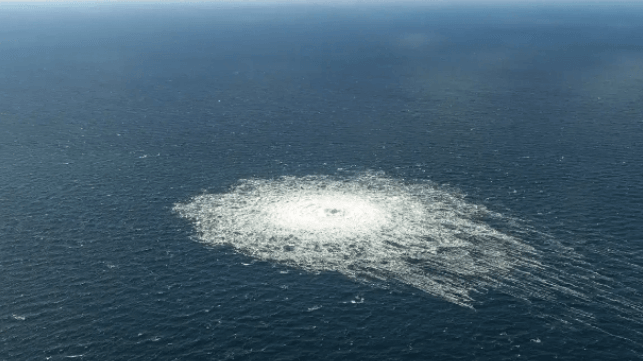Suspicions Turn to Russia as Investigation Into Pipeline Blast Begins

The government of Russia is the majority owner of the Nord Stream 1 and 2 gas pipelines, which were built to carry Russian gas to Germany. But when three out of four of the pipes in the network were ruptured by suspected explosions on Monday, suspicions in Europe and the U.S. turned to the system's beneficial owners. Quietly, Western defense officials suggest that Russia had the technical capability to carry out the attack undetected, as well as a geopolitical motive to destroy its own multibillion-dollar property.
Russian state-owned Gazprom is the majority owner of Nord Stream 1 and 2, along with minority partners Wintershall Dea, E.ON, Gasunie and Engie. Gazprom also owns the majority of the gas that would be transported through the pipelines if they were operational; with three out of four pipelines damaged, the company loses the physical capacity to transport and sell 80 billion cubic meters of gas into the European market per year.
Even intact, however, none of the lines were moving gas. For political reasons related to the invasion of Ukraine, all four Nord Stream pipelines were already shut down before the blasts, and the odds of ever realizing their full potential were in serious decline. In the near term, the damage will not likely affect energy flows.
The partial destruction of $20 billion worth of capital investment appears to be a downside for the Kremlin, but Western political leaders and analysts have pointed to possible benefits for Russia if it were willing to write off Nord Stream. As a demonstration of capability and will, an attack on the pipelines could be viewed as a powerful and carefully-timed threat to European energy security - and Western leaders are responding accordingly. Norway has increased military presence and patrol operations at its offshore oil and gas infrastructure, and in a statement Wednesday, top EU foreign policy official Josep Borrell warned that "any deliberate disruption of European energy infrastructure is utterly unacceptable and will be met with a robust and united response.”
Defense analysts and insiders have noted that Russia is among the limited number of nations with the capability to pull off an attack of this scale at a well-monitored, strategic location in Northern Europe.
“Only Russia can really be considered for this, especially since it stands to gain the most from this act of sabotage," said Gerhard Schindler, the ex-head of Germany's top spy agency, in an interview with Welt. “An unnoticed, conspiratorial damage to pipelines at a depth of 80 meters in the Baltic Sea requires sophisticated technical and organizational capabilities that clearly point to a state actor."
An unnamed UK security official told The Times that Russia could have dispatched a UUV to place explosive devices on the pipeline in a "premeditated and planned for" operation, days or weeks ahead of the event - then triggered the blast when ready.
The U.S. possesses similar capabilities, and Russia's government has blamed the Biden administration for the blasts. A U.S. official told the Washington Post that this allegation was "preposterous," and Secretary of State Anthony Blinken said Tuesday that a sabotage attack would be "clearly in no one’s interest." The U.S. reportedly warned German defense planners of the possibility of an attack on Nord Stream as early as this summer.
The opinions expressed herein are the author's and not necessarily those of The Maritime Executive.

